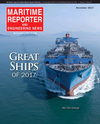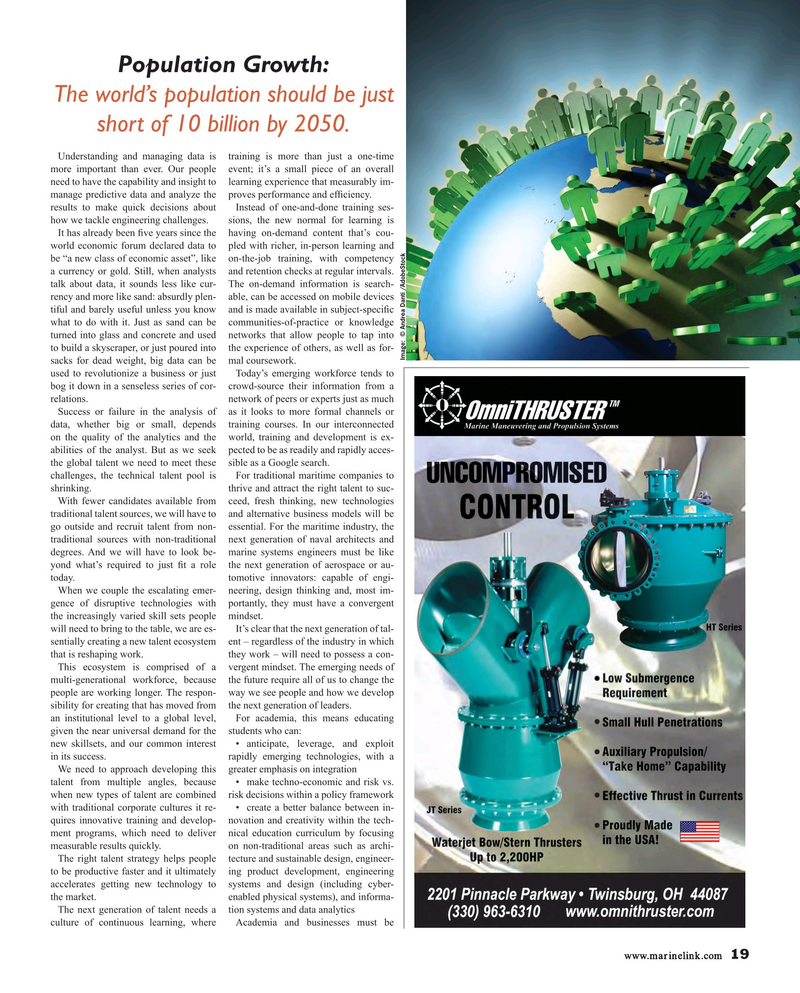
Page 19: of Maritime Reporter Magazine (December 2017)
U.S. Navy Quarterly
Read this page in Pdf, Flash or Html5 edition of December 2017 Maritime Reporter Magazine
Population Growth: The world’s population should be just short of 10 billion by 2050.
Understanding and managing data is training is more than just a one-time more important than ever. Our people event; it’s a small piece of an overall need to have the capability and insight to learning experience that measurably im- manage predictive data and analyze the proves performance and ef? ciency.
results to make quick decisions about Instead of one-and-done training ses- how we tackle engineering challenges. sions, the new normal for learning is
It has already been ? ve years since the having on-demand content that’s cou- world economic forum declared data to pled with richer, in-person learning and be “a new class of economic asset”, like on-the-job training, with competency a currency or gold. Still, when analysts and retention checks at regular intervals. talk about data, it sounds less like cur- The on-demand information is search- rency and more like sand: absurdly plen- able, can be accessed on mobile devices tiful and barely useful unless you know and is made available in subject-speci? c what to do with it. Just as sand can be communities-of-practice or knowledge turned into glass and concrete and used networks that allow people to tap into to build a skyscraper, or just poured into the experience of others, as well as for-
Image: © Andrea Danti /AdobeStock sacks for dead weight, big data can be mal coursework.
used to revolutionize a business or just Today’s emerging workforce tends to bog it down in a senseless series of cor- crowd-source their information from a relations. network of peers or experts just as much
Success or failure in the analysis of as it looks to more formal channels or data, whether big or small, depends training courses. In our interconnected on the quality of the analytics and the world, training and development is ex- abilities of the analyst. But as we seek pected to be as readily and rapidly acces- the global talent we need to meet these sible as a Google search.
challenges, the technical talent pool is For traditional maritime companies to shrinking. thrive and attract the right talent to suc-
With fewer candidates available from ceed, fresh thinking, new technologies traditional talent sources, we will have to and alternative business models will be go outside and recruit talent from non- essential. For the maritime industry, the traditional sources with non-traditional next generation of naval architects and degrees. And we will have to look be- marine systems engineers must be like yond what’s required to just ? t a role the next generation of aerospace or au- today. tomotive innovators: capable of engi-
When we couple the escalating emer- neering, design thinking and, most im- gence of disruptive technologies with portantly, they must have a convergent the increasingly varied skill sets people mindset.
will need to bring to the table, we are es- It’s clear that the next generation of tal- sentially creating a new talent ecosystem ent – regardless of the industry in which that is reshaping work. they work – will need to possess a con-
This ecosystem is comprised of a vergent mindset. The emerging needs of multi-generational workforce, because the future require all of us to change the people are working longer. The respon- way we see people and how we develop sibility for creating that has moved from the next generation of leaders.
an institutional level to a global level, For academia, this means educating given the near universal demand for the students who can: new skillsets, and our common interest • anticipate, leverage, and exploit in its success. rapidly emerging technologies, with a
We need to approach developing this greater emphasis on integration talent from multiple angles, because • make techno-economic and risk vs. when new types of talent are combined risk decisions within a policy framework with traditional corporate cultures it re- • create a better balance between in- quires innovative training and develop- novation and creativity within the tech- ment programs, which need to deliver nical education curriculum by focusing measurable results quickly. on non-traditional areas such as archi-
The right talent strategy helps people tecture and sustainable design, engineer- to be productive faster and it ultimately ing product development, engineering accelerates getting new technology to systems and design (including cyber- the market. enabled physical systems), and informa-
The next generation of talent needs a tion systems and data analytics culture of continuous learning, where Academia and businesses must be www.marinelink.com 19
MR #12 (18-25).indd 19 MR #12 (18-25).indd 19 12/7/2017 12:34:34 PM12/7/2017 12:34:34 PM

 18
18

 20
20
